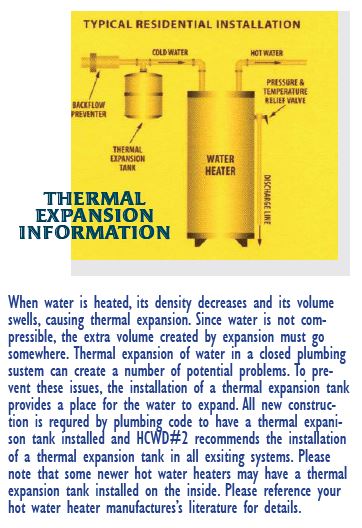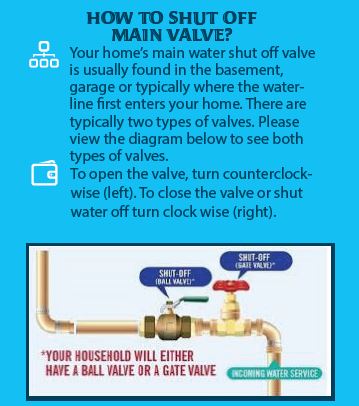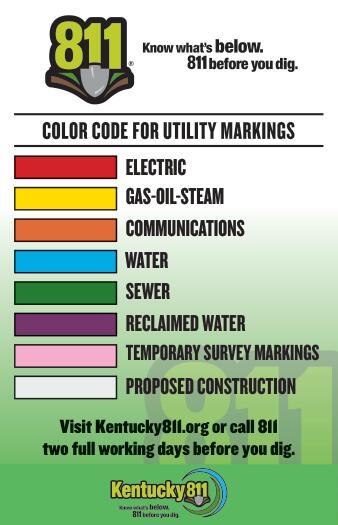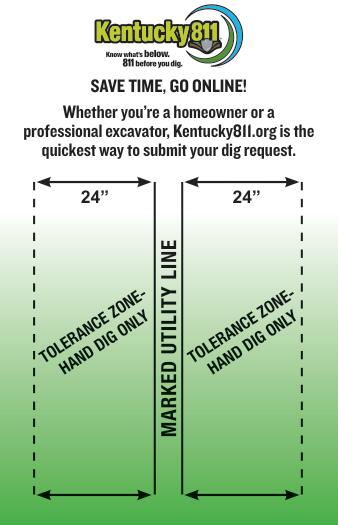We Have Answers
Find frequently asked questions and answers in our FAQ page.
Go Paperless!Our account services department is more than happy to start your account in person or our website at hcwd2.org. Please bring in a photo ID, $60 deposit (cash or card) and a copy of your lease if you are renting.
Photo ID
$60 deposit (cash or card accepted, please know that we require a $2.50 fee when using a card)
Copy of your lease (if renting) New accounts applications are available on our website. Be sure to attach a government issued photo ID, lease and payment information for your deposit. [Water-and-Sewer-Service-Application]
Yes, there is a $60 deposit required on all new accounts.
Unfortunately, due dates are unable to be changed because they are based on your service location. The District has four (4) billing cycles and each cycle has its own due date based on location. Due dates are:
- Blue (2) Cycle – Due on the 1st of the month, late fees assessed on unpaid bills on the 2nd of the month, subject to termination if payment has not been received on or before the 11th of the month.
- Green (4) Cycle – Due on the 8th of the month, late fees assessed on unpaid bills on the 9th of the month, subject to termination if payment has not been received on or before the 18th of the month.
- Red (1) Cycle – Due on the 15th of the month, late fees assessed unpaid bills on the 16th of the month, subject to termination if the payment has not been received on or before the 25th of the month.
- Orange (3) Cycle – Due on the 22nd of the month, late fees assessed unpaid bills on the 23rd of the month, subject to termination if the payment has not been received on or before:
- January 22nd bill, subject to termination February 2nd
- February 22nd bill, subject to termination March 5th
- March 22nd bill, subject to termination April 2nd
- April 22nd bill, subject to disconnection May 3rd
- May 22nd bill, subject to disconnection June 2nd
- June 22nd bill, subject to disconnection July 3rd
- July 22nd bill, subject to disconnection August 2nd
- August 22nd bill, subject to disconnection September 1st
- September 22nd bill, subject to disconnection October 2nd
- October 22nd bill, subject to disconnection November 1st
- November 22nd bill, subject to disconnection December 1st
- December 22nd bill, subject to disconnection January 1st
There is a 10 day grace period past the due date.
- Blue Cycle – Due 1st, grace period ends if payment not received on or before the 11th.
- Green Cycle – Due 8th, grace period ends if payment not received on or before the 18th.
- Red Cycle – Due 15th, grace period ends if payment not received on or before the 25th.
- Orange Cycle – Due 22nd, grace period ends if payment not received 10 days after due date which may vary depending on the number of days in the calendar month.
- Due January 22nd, grace period ends February 1st
- Due February 22nd, grace period ends March 4th
- Due March 22nd, grace period ends April 1st
- Due April 22nd, grace period ends May 2nd
- Due May 22nd, grace period ends June 1st
- Due June 22nd, grace period ends July 2nd
- Due July 22nd, grace period ends August 2nd
- Due August 22nd, grace period ends September 2nd
- Due September 22nd, grace period ends October 3rd
- Due October 22nd, grace period ends November 2nd
- Due November 22nd, grace period ends December 3rd
- Due December 22nd, grace period ends January 2nd
Customers are allowed two (2) extensions per rolling year. These extensions are automatically given if the bill is not paid by the end of the 10 day grace period past the original due date.
Example:
Blue Cycle
- Due – 1st
- Late – 2nd
- Grace period ends if payment not received on or before – 11th
- Extensions are given after the 10-day grace period on the 12th for up to two months per rolling year.
- After two extensions have been given, account is subject to termination beginning on – 12th
Green Cycle
- Due – 8th
- Late – 9th
- Grace period ends if payment not received on or before – 18th
- Extensions are given after the 10-day grace period on the 19th for up to two months per rolling year.
- After two extensions have been given, account is subject to termination beginning on – 19th
Red Cycle
- Due – 15th
- Late – 16th
- Extensions are given after the 10-day grace period on the 26th for up to two months per rolling year.
- After two extensions have been given, account is subject to termination beginning on – 26th
Orange Cycle
- Due – 22nd
- Late – 23rd
- Extensions are given after the 10-day grace period, for up to two months per rolling year on.
- (the grace period ends on different days depending on the number of days in the calendar month)
- January 1st
- February 1st
- March 4th
- April 1st
- May 2nd
- June 1st
- July 2nd
- August 1st
- September 1st
- October 2nd
- November 1st
- December 2nd
- After two extensions have been given, accounts are subject to termination beginning on:
- January 2nd
- February 2nd
- March 5th
- April 2nd
- May 3rd
- June 2nd
- July 3rd
- August 2nd
- September 2nd
- October 3rd
- November 2nd
- December 3rd
We can disconnect service several different ways. You may visit us in person to fill out the Disconnect Form or fill out the disconnect form under Customer Accounts – Disconnect Service.
Disconnect Service
Changes to accounts can be made in the office or by submitting the Account Change Form [ACCOUNT INFORMATION CHANGE FORM] to email at accounts@hcwd2.org. Please see the form for required documentation.
Payments are accepted in our office located at 1951 W Park Rd via cash, check or card. Customers may also pay online through the Authority Pay via check or card or through our automated phone system. Please have your account number and CID number available as phone payments are no longer processed except through the automated system. Also, please remember there is a $2.50 processing fee on all cards and online payments.
New taps are available for purchase in our office. Payments for new meters are taken via cash or check only.
5/8 x 3/4” Meter: $1,600
1” and larger Meters: Actual cost of labor and materials.
Although usage can vary from month to month, large jumps in usage can mean a leak has occurred. The most common issue we see is a running toilet. We offer free dye tablets in the office to check your toilet for leaks. Be sure to check appliances, faucets, hot water heaters and outside spigots for drips or cracks in pipes.
Make sure water in house isn’t being used (inside)
Locate water meter in black box or round metal box and remove lid, the meter box is normally located in front of the house (outside)
For digital meters start with lid of meter closed, then open, close and open lid again to get to the leak indicator screen ( should be all zero’s with flashing lines above the numbers) if any numbers appear on the screen with flashing lines you have water going through the meter. There will also be a plus symbol that will appear on register. If there is not usage inside of the house, the meter reading should not change.(outside)
Non digital meters, leak indicator will be a round red dial with a black line on the bottom right of register. If that dial is spinning, water is going through the meter (outside)
If you have determined that you have leak, go to the house and find the main water shutoff valve in your house (normally where the water comes into the house or at the hot water heater) Turn that valve off and go check the meter once again. If the meter still indicates usage, then you have a water leak outside on your service line from the meter to the main shut off valve. In most cases, the water line is positioned in a straight line from the meter box to the house. You can walk the water line and check for wet spots in the yard.
If meter is not running after the main water shut off valve is off, then the leak is inside your house. Check all water faucet hook ups inside of house (kitchen, bathroom, and washer hook ups) (inside bathroom, kitchen, basement)
If you have a high-water bill and your meter is not running, then the next step would be to check your toilet. If water connections are not leaking in house, then get some food coloring and take the tank lid off your toilet and put 10 drops of food coloring in tank. Do not use the toilet for 15-20 minutes and check the toilet bowl for colored water. If colored water is in toilet bowl then the valve/flange inside your toilet is leaking. (bathroom)
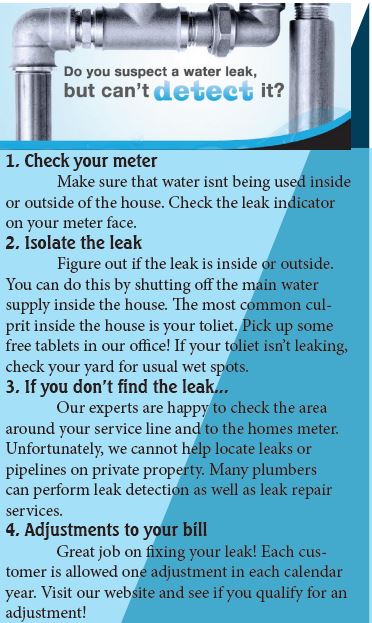
New accounts are scheduled to be started two (2) business days from the time of application.
A $25 new service fee is assessed to the first bill of each new account. This is a non-refundable service charge for our techs to inspect and perform any maintenance to the meter when transferring service to a new customer.
New customer deposits are refunded to the customer’s account after two (2) years of good history or two or fewer late payments. If service is disconnected before that time, the deposit is applied to the final bill and any additional funds are refunded to the customer.
Sure! To set up autopay simply fill out the AutoPay form below and attach a copy of your check. You may also come into the office with a voided check and fill out our AutoPay form in person. Your automatic payments will begin the following month.
Auto Pay Enrollment
Auto Pay Enrollment
E-billing is a new way for us to send your bill. Instead of mailing you a copy of your bill we can send it electronically. Signing up for e-bills is easy. We have an E-bill form on our website or in our office. Forms may be emailed to accounts@hcwd2.org to sign up.
I want to go paperless!
Although usage can vary depending on household habits, the average adult uses 2,000 gallons per month while the average child uses 1,000 gallons per month.
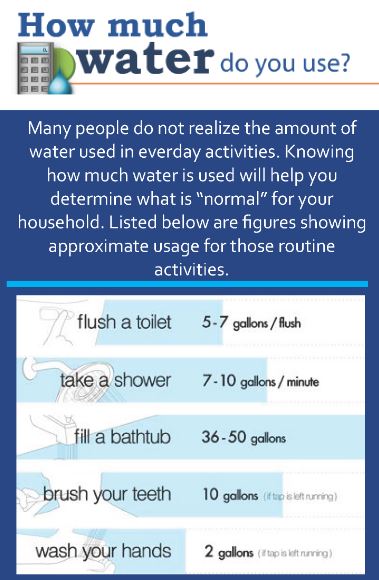
Yes, 0-2,000 gallons is the minimum usage for a standard residential 5/8’ x 3/4” meter. Minimum bills for customers who are not charged for sewer are billed $19.10 including tax, and customers who have sewer are $29.10 including tax.
For residential customers with a standard 5/8’ x 3/4” meter:
0-2,000 gallons (WATER) $18.54 plus tax
0-2,000 gallons (CITY OF ELIZABETHTOWN SEWER CUSTOMERS) $10.00 plus tax
0-2,000 gallons (HARDIN COUNTY SEWER CUSTOMERS) $30.00 plus tax
For every 1,000 gallons above the minimum – WATER is $5.17 per thousand gallons.
For every 1,000 gallons above the minimum – CITY SEWER is $4.40 per thousand gallons.
For every 1,000 gallons above the minimum – COUNTY SEWER is $10.00 per thousand gallons.
Yes, late fees are 10% of the total account balance and are applied to the account the next business day following a due date.
Yes. Your payment info is processed through our secure payment providers and servers.
The District does not currently do credit checks but hopes to add the optional service soon.
Locate water meter in black box or round metal box and remove lid, the meter box is normally located in front of the house.
To read a digital meter, open the plastic lid and the meter reading will be displayed. Read the numbers that are underlined and then add two zeros on the end. This will be the actual reading.
To read analog or non-digital meters, read the numbers from left to right before the decimal, this would be actual use to 100 gallons. The analog hand represents tens of gallons, one full sweep equals 10 gallons. Should the analog hand be in between numbers use the lower of the two numbers.
During winter you can keep your faucets at a small drip to allow water to flow through the pipes or wrap your pipes with towels or other insulation to keep them protected. It is also helpful to open cabinets under sinks to allow the pipes to be warmed by the heat in the home.
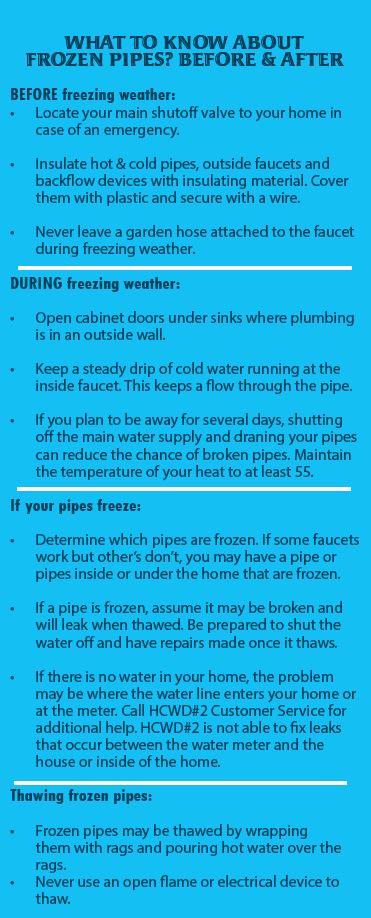
If you experience random drops in pressure or are completely out of water, please call our office at 270-737-1056 for assistance.
The District strives to keep customers informed during maintenance periods. In the event of a boil water advisory, information will be posted on our website, our Facebook page, and announcements will be made on local radio stations 94.3 The Wolf, Big Cat 105.5 and Quicksie 98.3
Yes! We have two bulk water loading stations to accommodate those who need to fill bulk tanks. Water is sold at $0.50 per approximately 100 gallons. We also have a temporary hydrant meter program to accommodate special bulk water needs. The most common reason for bulk water sites includes agricultural purposes, filling a cistern or swimming pool, or to simply have clean water for a jobsite.
Visit our bulk water stations:
- 401 Waterworks Drive in Elizabethtown, KY
- This location accepts quarters only.
- 1300 Cave Road in Glendale, KY
- This location accepts quarters, dollar bills, five-dollar bills, & ten-dollar bills.
In September 2010, the HHS assembled a panel of scientist to review new information regarding the ingestion of fluoride and to develop new recommendations for community water fluoridation. The findings from the review led the U.S. Department of Health and Human Services (HHS) to propose changing the recommended fluoride level for community water systems to 0.7 mg/l. Therefore, Hardin County Water District No. 2 adjusted the naturally occurring fluoride levels in your drinking water to the recommended level. For additional information regarding Kentucky’s oral health program, please call the Kentucky Cabinet for Health and Family Services at 502-564-3246.
The frequency of testing depends on the contaminant in question. For instance, chlorine is tested with on-line instrumentation continuously throughout the treatment process and distribution system. Other contaminants may be tested multiple times each day, weekly, monthly, or less frequent depending on risk factors. For a list of detected contaminants, results, and the frequency of the testing, please see our Consumer Confidence Report. [CCR2022]
Due to the source of our water supply and the geology of the area, our water is considered moderately hard. For additional information select this link: (CCR2022)
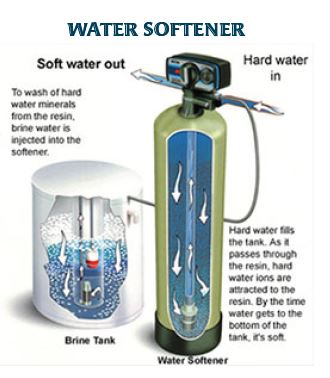
Higher pressures can stress plumbing, plumbing fixtures, and appliances. The District does not require, but highly recommends the installation of a pressure regulator to help protect your plumbing and appliances from higher pressures.
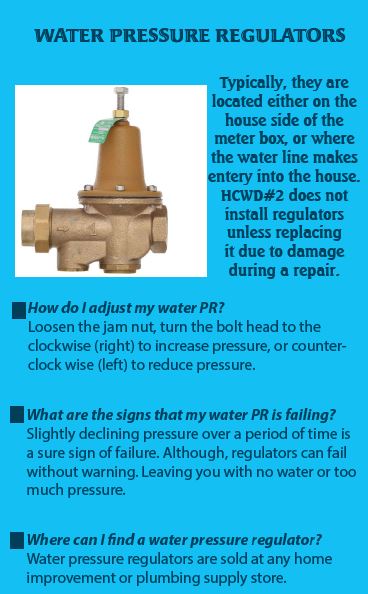
Concerns or questions about water quality can be reported to our office at 270-737-1056. We will gladly send a service tech to your area to check and perform any maintenance if necessary.
The District does not require, but highly recommends the installation of an expansion tank. Pressure within a closed plumbing system can cause damage and may be prevented with a properly installed expansion tank. In some instances, the installation of an expansion tank may be required by Kentucky plumbing code. We recommend that you check with a licensed plumber to determine your needs.